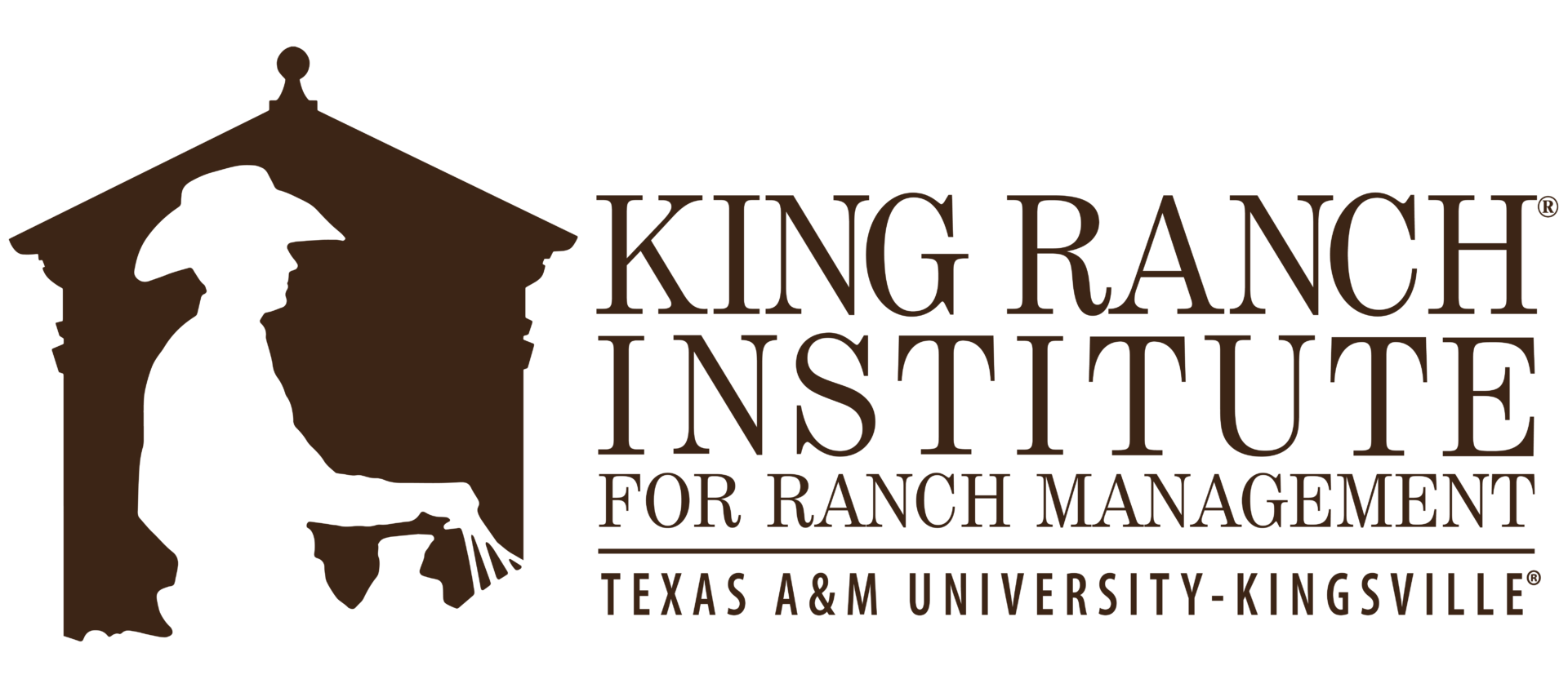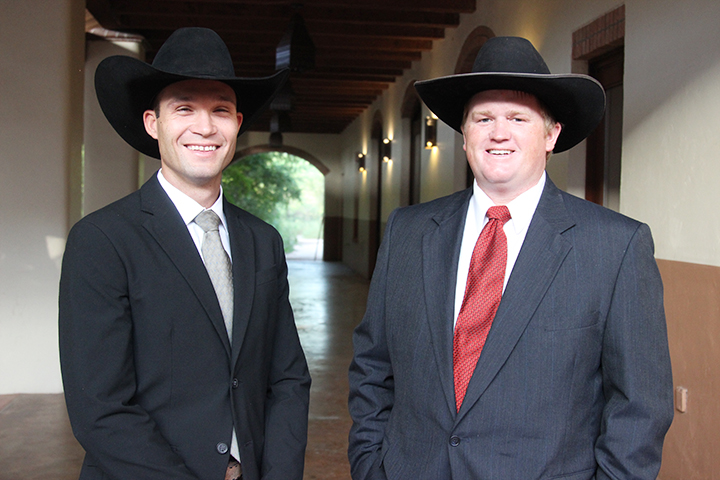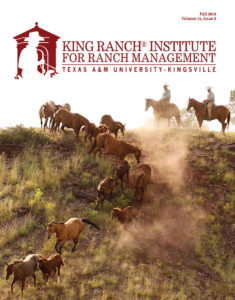KRIRM Welcomes Two New Ranch Management Graduate Students
Feature story appearing in the KRIRM Fall 2018 Newsletter
By Kindra Gordon
A common denominator among most successful individuals is often a commitment to lifelong learning. Two individuals dedicated to that learning journey are Tyler Gardner and Zane Herrin, who have been selected as the new King Ranch® Institute for Ranch Management (KRIRM) graduate students joining the ranch management master’s program this fall.
Despite different backgrounds, both men share a passion for the ranching industry and aspire to enhance their skills through the KRIRM program.
Specifically, Herrin says, “Through the institute, I hope to expand my problem solving abilities and people management skills through their systems thinking approach. I am also looking forward to growing my business management knowledge.”
Likewise, Gardner anticipates expanding his skills in finance, leadership and human resources. He expresses, “After completing the program I hope to apply the skills that I have acquired and refined back to the beef industry through a career in ranching…I hope to be able to add value to the places that I work and help manage.”
Tyler Gardner
Growing up on a dairy operation, Gardner says he recognized early on that he preferred working with horses and beef cattle over milking cows. At the age of 14, he began helping a neighbor on his ranch, and says, “I was hooked on the beef industry.” He continued to work for that neighbor throughout his high school years, and after high school moved to Northern Utah to work on a ranch. His responsibilities included calving cows and heifers as well as making ranch improvements with cross fences and water infrastructure with solar panels and pipe lines.
Gardner then pursued a degree at the University of Wyoming in animal science with an emphasis in range management. During college he interned with the Rex Ranch in the Western Nebraska Sandhills, and upon graduating in 2014, returned to the Rex Ranch to work full time. (He will leave the Rex Ranch to enroll in the KRIRM program.)
Gardner’s role at the Rex Ranch has included being responsible for multiple different classes of cattle ranging from yearlings, fall cows, spring calving cows, first-calf heifers, fresh weaned calves and bulls. He has also enjoyed the ranch’s focus on range management and the health of pastures.
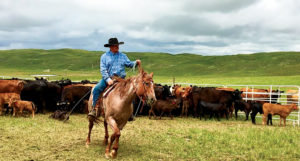
Tyler Gardner
He credits his experiences at the Rex Ranch for introducing him to several individuals who have graduated from the KRIRM program. “I have always heard great things about the program from them, and I am excited to soon be a part of it,” Gardner says.
He is particularly interested in learning more about financial management. He shares, “I have been part of putting our budgets and costs together here at Rex Ranch, but I am interested in learning more about managing ranch finances.”
Gardner is also interested in gaining new perspective in leadership and employee management. He explains, “I firmly believe making a place successful happens when the crew and leadership share the same vision and work together.”
Gardner and his wife Katie will relocate to Kingsville with their young family, which includes son Briggs (6), and daughters Addley (4) and Tinley (1). Gardner says his hobbies include time outdoors with his family. “We go fishing and hunting, swimming. Whatever we can do that gets us outside.”
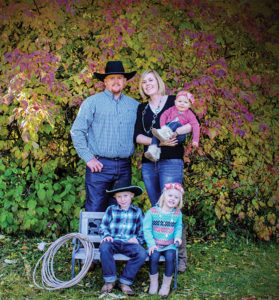
Tyler Gardner with his wife and three children.
As for a directive toward life, Gardner says, “I once had a shop teacher tell me that ‘Anything that is worth doing is worth doing right.’ I have always remembered that,” he concludes.
Zane Herrin
Raised on Herrin Cattle Company, a commercial cow/calf operation that scatters within five counties in west Texas, Herrin says he developed a deep love for livestock and wildlife and a passion for the beef industry and ranching heritage.
He pursued a degree in wildlife management with a concentration in production at Tarleton State University, and says, “The classes in wildlife science, range science, and beef cattle production reaffirmed my belief that I belong in the beef industry.”
Following college graduation, Herrin served as the livestock manager at the Callaghan Ranch in Encinal, Texas – and worked under KRIRM alum Darrell White. He then transitioned to Hebbronville, Texas, in a role as the assistant livestock manager for East Foundation Ranches. While there, Herrin managed the Foundation’s flagship project: the Coloraditas Grazing Research and Demonstration Area, a study that was initiated across more than 18,000 acres and is designed to monitor the effects of cattle stocking rate and grazing system on cattle production, wildlife populations, and rangeland.
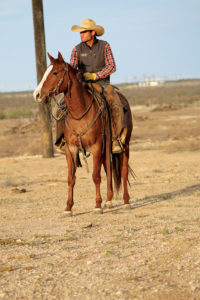
Zane Herrin
Of his interest in the KRIRM program, Herrin shares, “I initially became aware of the institute while I was exploring graduate school options before I finished my undergraduate program…working for Darrell White also had a big impact on my understanding of the program and grew my interest.”
As he prepares to embark on his KRIRM journey, Herrin says he is especially interested in the projects with partnering ranches along with the classes and lectureships. He views these as great opportunities to grow as a ranch manager.
Herrin adds, “I aspire to do well, go far, and leave a lasting impact to improve the industry as it currently exists. The education, experiences, and networking opportunities through KRIRM will equip me with the necessary tools to become a better leader and manager.”
Herrin and his wife Sarah will relocate to Kingsville. Herrin cites being horseback as his hobby, including starting colts and riding young horses, as well as team roping and competing in ranch rodeos. He adds, “I truly love working cattle, even though that isn’t a “hobby,” I enjoy it just as much. Additionally, he says, “Given the opportunity I enjoy hunting, fishing, camping, and just being outside. I love my family and spending time with them.”
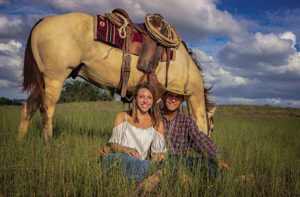
Zane and his wife, Sarah.
A guiding quote for Herrin is his favorite Bible verse, which is Matthew 5:16, “Let your light so shine before men that they may see your good works and glorify your Father in heaven.” Herrin concludes, “I find it applicable in many ways. I think on top of applying it to how we should live, we could apply it to how we treat the land, livestock, horses, and people that we are entrusted with working.”
